For whatever reason, people get very adversarial about their programming plans. As you all know, we just HAVE to have those debates about what is better: 5/3/1 or Cube, Sheiko or Smolov, and PNP vs Starting Strength. This somewhat makes sense. After all, if you’re doing one program, you can’t be doing another. There’s a worthy opportunity cost to discuss.
What confounds me the most, though, is that this same pattern tends to play out when we discuss nutrition. What is the “best diet”? IIFYM? Paleo? “Clean eating”? Intermittent Fasting? Keto? GOMAD? The “See Food” Diet? The reality is that, in my opinion, every single one of these nutritional strategies can be successfully used to improve body composition and strength… given the right circumstances.
If you’d rather watch than read:
Counting Your Macros
Look, all nutritional strategies do essentially the same thing: they attempt to modify how much you eat. Now, typically, a nutritional strategy will accomplish this task by modifying either what you eat, when you eat, or both simultaneously. In the end, the particular science behind the diet and whether or not it is truly “optimal” is sometimes a secondary consideration. Let me explain.
In my opinion, the “most optimal” nutritional strategy is macronutrient counting with planned meal times. Why? Because you’re in (nearly) precise control of what you eat and when you eat it. You know your intake down to the gram (or so).
That said, macro counting is not a sustainable lifestyle for everybody. That’s right I said it. Flexible dieting and macro counting simply does not work for everybody. Even if a strategy is theoretically optimal, if it is not sustainable, if the individual cannot comply with the plan, it is worth less than the paper it is written on. Worse yet, the inability to comply, often due to unalterable lifestyle factors, tends to make people feel like failures. If this is the case, you need to realize alternative strategies exist and, despite being “less optimal”, may actually be more effective in the real world.
Now, with the context set, let’s take a look at a few popular diets and see when they might be appropriate.
Low Carb and Ketogenic Diets
Let’s first consider a “low carb” diet. A true low carb diet, a diet that produces a state of ketogenesis, is one of the most powerful and effective fat loss diets in existence. Now, there is a monstrous amount of underlying science here. You can read all about it in Lyle McDonald’s “Ketogenic Diet” book.
That said, the most important take away is that when you put people on a low carb diet, they can often spontaneously consume ~50% less calories. That is, while still feeling full, and eating whenever and however much they want, they can consume up to 50% less food. For someone who feels neurotic when they count, or for someone who wants to occasionally eat out without worrying about keeping track, a targeted ketogenic diet with a few cheat meals can produce amazing fat loss results.
Now, if you’re someone trying to gain weight and build muscle, does it make any sense at all to eat a low carb diet? Probably not. Most people won’t eat enough to get a decent surplus in using this strategy.
If you’re paying close attention, I’ve basically described one of the key reasons why John Kiefer’s Carb Night Solution and Carb Backloading diets are so successful for many powerlifters. During the majority of the week or day, they eat a no carb diet. This greatly reduces their overall intake during these periods. This can allow them to then eat “cheat” meals without amassing and exorbitant amount of calories at the end of the day. Again, this may not be as optimal as counting, but, if the individual can keep the cheat meals reasonable, it may allow them far more social freedom with their eating and it may be more sustainable in the long run.
Intermittent Fasting
Another diet strategy that was incredibly popular at one point in time was intermittent fasting. Now, for those unfamiliar intermittent fasting is simply a protocol by which you eat all of your calories for the day inside of a certain window of time. A typical intermittent fasting diet calls for 16 hours of “fasting” per day with an 8 hour feeding window. Again, similar to ketogenic diets, there is a massive amount of underlying science which may or may not suggest that there are fat loss benefits, above and beyond calorie manipulation, to eating in this manner. And, again, this is irrelevant for most practical purposes.
What really matters here is that IF, by restricting when you can eat, tends to allow people to eat bigger, more satisfying meals without amassing a ton of calories by the end of the day. After all, if you only eat twice per day, even two big meals probably won’t add up to a huge amount of calories based on your appetite.
Interestingly enough, to go back to Kiefer’s popular diets, his strategy employs both intermittent fasting AND low carb dieting. When combined, they help battle hunger and control calories extremely effectively. That is really my entire point here. You can mix and match these strategies to achieve whatever effect you’re trying to get.
But what if you’re a guy with a fast metabolism who is already having trouble eating enough? Does IF make sense? No, probably not. Smaller meals spread out throughout the day often make consuming more food much easier.
Clean Eating
What about something as hated as “clean” eating? Well, the same situation plays out again. Everyone gets caught in the minor details. People vigorously debate if there is any scientific benefit to “eating clean”. People vigorously debate if there is even an appropriate way to define “clean eating”. At the end of the day, it isn’t that important in practice.
If we define clean eating as limiting your sugar intake, eating a good deal of fiber, keeping the fat intake down, and eating primarily single ingredient foods, there are numerous practical benefits. For example, without a ton of “junk food” in your diet, you won’t reinforce unhealthy food reward patterns. You’ll be able to eat less and still achieve satiety. You’ll spontaneously put together a pretty good macro profile most of the time (without counting). In other words, you’ll likely improve your body composition without “trying” (in a manner of speaking). This is often a fantastic strategy for people who are dieting but still want to feel full and/or people who are trying to gain weight but gain far too quickly when they just eat whatever they want.
With that said, some people with fast metabolisms, who tend to be naturally lean, cannot eat “clean” while gaining weight effectively. It just requires a volume of food that is enormous. For these people, diets like the “See Food” diet can be effective. You see food, you eat the food. For these people, in extreme cases, even something like drinking a gallon of whole milk a day can work fairly well. Is it optimal? Perhaps not. Will it work fairly well in the right case? Yes. Should a fat guy with a slow metabolism do GOMAD? Hell no.
Use the Right Diet Tool for the Job
What is my real point in all of this? Nutrition plans need to take lifestyle into consideration and make it the most important consideration. Yes, it is absolutely true that, in my opinion, counting your macros year round is going to lead to the most optimal body composition results. That said, just as in programming, “optimal” does not mean “necessary for progress”.
I have friends who can maintain ripped abs on a see food diet. I have friends with a metabolism so shitty that if they don’t do some form of low carb dieting or calorie counting, they’re back up at 20% body fat within 3 weeks. I have friends with monster appetites who can get truly fat on a clean diet. I have friends with the appetite of your average baby squirrel who can’t even get fat drinking a gallon of milk a day.
You have to take into account what your preferred lifestyle is, what your goal is, and what your genetics allow for when formulating your personal nutritional strategy. Whether your strategy is optimal matters a lot less than whether you produce sustainable results. Don’t let anybody tell you otherwise. As a coach, I work with people from a zillion different types of backgrounds. If you try to make them all do the same thing, it just doesn’t work.
Nutritional zealotry is stupid. There is a time and a place for everything.
Like this Article? Subscribe to our Newsletter!
If you liked this articled, and you want instant updates whenever we put out new content, including exclusive subscriber articles and videos, sign up to our Newsletter!
Questions? Comments?
For all business and personal coaching services related inqueries, please contact me:


